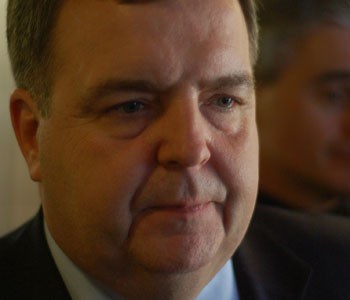The province’s finance minister arrived in the city Thursday to hear wish lists from regional leaders before the 2010 Ontario budget is released next month.
More than 40 organizations met with Minister Dwight Duncan at Lakehead University for the pre-budget consultation. Speakers were kept to a two-minute limit at the three-hour session, which was closed to the media. Despite the time limit, Nishnawbe Aski Nation Grand Chief Stan Beardy said it was a good chance for community leaders to voice their opinion.
Beardy said people are worried about the economy and the province’s $25 billion deficit. The Grand Chief said he thinks spending on infrastructure rather than paying down the deficit will create revenue for Ontario.
With great expectations for the ring of fire, Beardy said investing in the North is the way to wealth creation.
"Looking at the far North there has to be money invested in infrastructure. We need energy up North, grid lines, telecommunications and we need transportation to create the wealth that is up north" said Beardy. "It’s really important that the government looks at opportunities to invest."
Beardy added that First Nations people can be a significant part of the province’s wealth creation.
"We want to be part of the solution and we see ourselves as the solution," he said.
Beardy wasn’t the only speaker who said the budget should feature more infrastructure spending. LU’s vice-president of administration and finance, Michael Pawlowski, asked the minister to consider funding a $36 million research laboratory at LU.
Called Biofor, the lab would create chemical, health and bio-energy products with help from the forestry industry. Pawlowski said the facility, which would be built on Balmoral Street, would also develop pilot projects such as bio-energy furnaces.
He said most people at the meeting with Duncan said spending would actually create revenue for the province faster than paying down the deficit.
"Once you get people working, companies growing, taxes are paid and the revenues will go up," Pawlowski said.
Duncan said job creation in the North would be a priority during budget talks. This minister said the province has an obligation to work on creating jobs.
"In an area like this where the unemployment rate is still in the upper eight per cent range that’s not good enough, we have to keep working," Duncan said. "We have a real obligation to address jobs."
Meeting with members of the forestry, health care, social assistance and education sector’s Thursday, Duncan said he’s confident that Northern Ontario will bounce back.
"I’m very bullish on the North," said Duncan. "It’s a desire that we build on our previous efforts in working with the communities here in the northwest and across the North. A desire that the government will help the North realize its full potential recognizing that we’ve come off a few really tough years."
While health care consumes 43 per cent of the province’s operating budget at over $42 billion, Duncan said health concerns will be the most difficult to manage over the coming years.
As health-care costs grow five to seven per cent annually, against Ontario’s revenue growth of two per cent, maintaining care while not trimming from other sectors will become increasingly difficult.
Next year baby boomers turn 65 and by 2012 health care spending is expected to consume more than 50 per cent of the province’s budget. Duncan said he doesn’t have any easy answers on how health care costs can be fixed.
"You can do the arithmetic, you can see that that is not a sustainable way to do health care," Duncan said. "It’s the elephant in the room…it’s enormous and it’s going to come even faster in the next 10 years…the rate of growth in the services they will need and demand are going to start to grow quite exponentially in the coming years."
Sign in or register
- Messages
- Post a Listing
- Your Listings
- Your Profile
- Your Subscriptions
- Your Likes
- Your Business
- Support Local News
- Payment History
Registered Users
Already have an account?
New Users
Create a free account.





